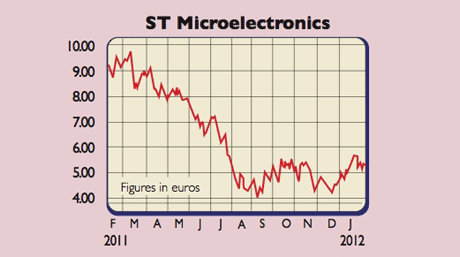Get the latest financial news, insights and expert analysis from our award-winning MoneyWeek team, to help you understand what really matters when it comes to your finances.
You are now subscribed
Your newsletter sign-up was successful
Want to add more newsletters?

Twice daily
MoneyWeek
Get the latest financial news, insights and expert analysis from our award-winning MoneyWeek team, to help you understand what really matters when it comes to your finances.

Four times a week
Look After My Bills
Sign up to our free money-saving newsletter, filled with the latest news and expert advice to help you find the best tips and deals for managing your bills. Start saving today!
To compete with Apple and Google, Nokia announced last April that it would move all its smartphones on to the Windows software platform. That's good news for Microsoft, but not for firms that supply the Nokia Symbian handsets, which are now heading for the scrap heap.
ST Microelectronics has been one of the victims, as the world's seventh-biggest semiconductor manufacturer. It has a 50:50 joint venture with Ericsson, which itself suffered a 30% fall in revenues to $1.55bn in 2011 and posted an operating loss of $812m. Yet this masked a creditable performance from the remaining 84% of the group. Here EBITA came in at $934m (an 11.4% margin) on turnover up 1% to $8,183m.
Car sales were up 18%, and there was a 90% rise at the MEMS unit, which makes gyroscopes for iPhones and games controllers. Motion control technology allows the screen to switch automatically from portrait to landscape when the device is rotated 90.
MoneyWeek
Subscribe to MoneyWeek today and get your first six magazine issues absolutely FREE

Sign up to Money Morning
Don't miss the latest investment and personal finances news, market analysis, plus money-saving tips with our free twice-daily newsletter
Don't miss the latest investment and personal finances news, market analysis, plus money-saving tips with our free twice-daily newsletter
The top priority for CEO Carlo Bozotti is to stop the rot at ST-Ericsson. If there's no sign of positive cash flow soon, I suspect the division will either be sold or shut down. Indeed, on a recent analyst conference call Bozotti admitted as much, saying "we will not let this continue. ST-Ericsson is in a crucial phase focusing on improving execution, lowering its break-even point and reviewing its road map to sustainable profitability."
ST Microelectronics (EuroNext: STM)

So what does this mean in terms of valuation? Let's assume there's no miracle cure for the Ericsson joint venture, and it has to be closed in 2012 at a cash cost of $1bn. The long-term prospects for the remainder of the group look attractive due to its $177bn addressable (if cyclical) market, driven by the proliferation of electronic gadgets. So I value the group on a ten-times EBITA multiple. Adjusting for the net cash of $762m, a $409m pension deficit and $1bn in closure costs, that delivers an intrinsic worth of $9.2bn, or about €7.50 a share.
The chief concerns are another global recession, a lack of decisive action at ST-Ericsson, price deflation and product obsolescence. Indeed, the board anticipates first-quarter revenues to decrease 4% to 10% compared to last quarter.
Nevertheless, with cutting-edge technology and around 21,500 patents, ST Microelectronics looks well placed to prosper from the next stage of internet services.
Rating: SPECULATIVE BUY at €5.40
Get the latest financial news, insights and expert analysis from our award-winning MoneyWeek team, to help you understand what really matters when it comes to your finances.
Paul gained a degree in electrical engineering and went on to qualify as a chartered management accountant. He has extensive corporate finance and investment experience and is a member of the Securities Institute.
Over the past 16 years Paul has held top-level financial management and M&A roles for blue-chip companies such as O2, GKN and Unilever. He is now director of his own capital investment and consultancy firm, PMH Capital Limited.
Paul is an expert at analysing companies in new, fast-growing markets, and is an extremely shrewd stock-picker.
-
 How a ‘great view’ from your home can boost its value by 35%
How a ‘great view’ from your home can boost its value by 35%A house that comes with a picturesque backdrop could add tens of thousands of pounds to its asking price – but how does each region compare?
-
 What is a care fees annuity and how much does it cost?
What is a care fees annuity and how much does it cost?How we will be cared for in our later years – and how much we are willing to pay for it – are conversations best had as early as possible. One option to cover the cost is a care fees annuity. We look at the pros and cons.